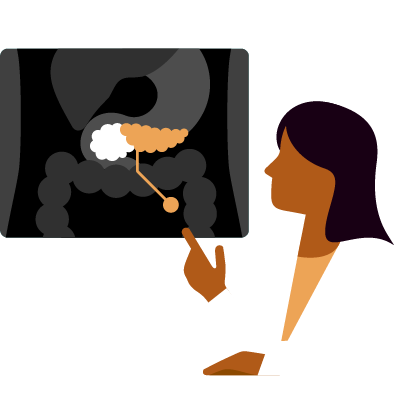Pancreatic Enzymes Explained

Your pancreas plays a number of important roles in the body.
One of its most significant jobs is producing pancreatic enzymes to help your body digest food. When it operates at full capacity, the pancreas emits about eight cups of secretions—enzymes mostly—into the small intestine daily. Unfortunately, if you have pancreatic cancer, tumor location, inflammation, and treatment, including surgery, may inhibit your pancreas’s ability to make enzymes.
“Without sufficient pancreatic enzymes, your body can’t absorb fat, so you end up pooping it out,” explains Dr. Shaalan Beg, GI cancer specialist at Harold C. Simmons Comprehensive Cancer Center at University of Texas Southwestern Medical Center, Dallas. “The classic symptom is greasy, oily stools that are foul-smelling and float.” But the fallout of insufficient pancreatic enzymes extends beyond stinky stool.
If your pancreas doesn’t make enough enzymes to break down food, it’s tough to achieve optimal nutritional status. Not only will you lose weight, but your body is unlikely to absorb sufficient nutrients, especially fat-soluble vitamins A, D, E, and K. The end result: weight loss, loose stool, cramping, indigestion, gas, and bloating.
Breaking Down Pancreatic Enzymes
Pancreatic enzymes break down food so your body can absorb calories and nutrients. If part of your pancreas has been removed, or if a tumor is preventing the flow of pancreatic enzymes to the small intestine, you may not make enough enzymes to break down your food—a dilemma that affects about one-third of pancreatic cancer patients.
If you fall into that camp, supplementing lost enzymes can help minimize symptoms and enhance quality of life. The three enzymes you need:
- Lipase: In concert with bile from the liver, lipase breaks down fat molecules into usable particles.
- Protease: Protease not only breaks down protein from food, it also helps eliminate bacteria, yeast, and protozoa.
- Amylase: Amylase breaks down carbohydrates into glucose for easy absorption.
The trouble is, the symptoms of insufficient pancreatic enzymes, such as loose stool and cramping, often mimic the side effects of chemotherapy. How do you know whether your symptoms are treatment-related or due to insufficient pancreatic enzymes? “Take notice of what makes your diarrhea worse. Is it a cupcake or a cheeseburger?” Beg asks. If it’s fat-laden foods, chances are good you’re not making enough pancreatic enzymes.
Pancreatic Enzymes How-to-Guide
Sometimes people who are affected by pancreatic cancer, surgery or not, will require supplemental enzymes for life. Some may experience resolution of symptoms after use of enzyme supplementation for a few months or years. However, enzymes are not the solution for all of the possible causes of diarrhea.
In every case, it’s important to ask your doctor or registered dietitian whether you should take pancreatic enzymes. If the answer is yes, follow these guidelines:
- Choose a prescription brand: There are dozens of pancreatic enzymes on the market, but the FDA only regulates prescription products. Over-the-counter pancreatic enzymes are considered dietary supplements, not medications, so they do not have to uphold the same rigorous safety standards.
- Start at the first bite: Take enzymes with the first bite of food to mimic the secretion of pancreatic enzymes. If you’re taking multiple capsules, spread the dose throughout your meal. Enzymes won’t work as well as if they’re taken at the end of a meal or snack.
- Use the appropriate dose: The dose depends on a variety of factors, including weight, symptoms, and degree of disease. “There’s often a period of trial and error in terms of dosing, but we usually start at about 500 lipase units per kg of body weight. The therapeutic range, 1,000 to 2,500 lipase units per kg of body weight for each meal, is often needed but we titrate dosage based on symptoms,” explains Shelli Hardy, M.C.N.,R.D., C.S.O., L.D., an oncology dietitian at UT Southwestern. Your doctor may also prescribe acid-reducing medication, such as proton pump inhibitors and H2 blockers, to improve the effectiveness of pancreatic enzymes. After finding the appropriate dosage of enzymes, you should notice a decrease in symptoms of gas, bloating, indigestion, weight loss, light-colored and smelly stools.
- Options for taking enzymes: Capsules are usually swallowed whole but occasionally patients find the larger doses difficult to swallow. Capsules come with an enteric coating to protect the enzymes from breaking down before they reach the stomach. If needed, open the capsule and mix the contents with slightly acidic foods such as applesauce to ensure the enzymes activate at the right time. Do not chew and avoid mixing the contents with dairy products, such as ice cream, custard, or milk.
- Keep a log: If you keep track of everything you eat, and note how you’re feeling, you’ll be better equipped to pinpoint the source of your symptoms. “Keeping a food log for a week or two can help your doctor come up with a plan and an appropriate starting dose for enzymes, if you need them,” Beg says.
Purchasing Pancreatic Enzymes
Prescription pancreatic enzymes are similar to each other in terms of safety and quality. Deciding which brand to choose is often a matter of dollars and cents, not effectiveness.
“Pancreatic enzymes can be very expensive,” Hardy says. “Sometimes insurance companies have a preferred brand, so it’s always best to check with them before leaving your doctor’s office with a specific prescription.”
FDA-approved products include:
- CREON®
- Pancreaze®
- Pertzye®
- Viokace®
- Zenpep®
Most of these brands have some sort of assistance program to help defray costs. Others offer a one-time, 50-count free trial. You can also search for discounts using programs like GoodRx®. Medicare coverage can be a little trickier. Ask your provider or registered dietitian about options available for the brand of enzymes they have prescribed.
“Patients who are not producing sufficient enzymes may be afraid to eat. They’re embarrassed about gas, they start to associate food with pain, and they inevitably lose weight,” says Hardy. “For these patients, taking pancreatic enzymes can be a game changer.”
They’re also one of few medications that make patients feel better, not worse. “Supportive care medicine matters more to our patients than the chemotherapy treatments we’re giving them,” Beg says. “Pancreatic enzyme supplementation for patients who are lacking them can dramatically improve their health, well-being, and ability to tolerate treatment.”



